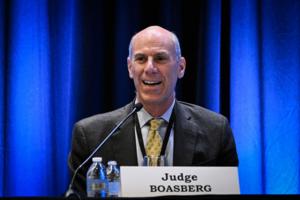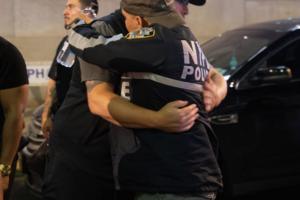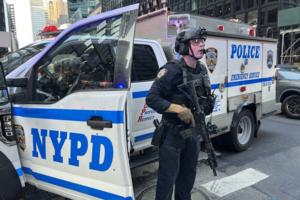Current News
/ArcaMax

Florida has no formal hurricane plan for Alligator Alcatraz
MIAMI — After weeks of requests from politicians and media, the state of Florida said it has no formal, completed plan for how to handle a hurricane at Alligator Alcatraz, the new immigrant detention site in the heart of the Everglades.
Two weeks ago, the Miami Herald requested “the completed hurricane/disaster plan for Alligator Alcatraz�...Read more

Justice Department hits judge in El Salvador deportation case with ethics complaint
WASHINGTON — The U.S. Justice Department filed an ethics complaint accusing a federal judge in Washington of making “improper” comments about President Donald Trump earlier this year, ratcheting up growing tensions between the executive and judicial branches.
The misconduct claim against U.S. District Chief Judge James Boasberg was ...Read more

NYC shooting victims include police officer, Blackstone executive, 2 other workers
NEW YORK — A Blackstone executive, who was also a mother of two, and a heroic NYPD officer survived by his pregnant wife and sons were among the four people fatally shot inside a Midtown Manhattan skyscraper on Monday.
Gunfire erupted inside the Park Avenue office tower, which is owned by Rudin Management and houses offices for the NFL as ...Read more

Trump EPA moves to eliminate landmark scientific rule that's the basis for climate regulations
The Trump administration’s U.S. Environmental Protection Agency proposed on Tuesday revoking a science-based determination that pollution fueling climate change harms public health. The so-called endangerment finding has since 2009 underpinned federal regulations for vehicles, power plants and other sources under the Clean Air Act.
EPA ...Read more

Sean 'Diddy' Combs makes another bid at bond ahead of sentencing
NEW YORK — Sean “Diddy” Combs is making yet another bid at bail as the Harlem-born mogul awaits sentencing his Oct. 3 sentencing for two prostitution-related charges.
Lawyers for the 55-year-old convicted Bad Boy Records founder, who was recently denied presentencing bail, argue that he should be released on $50 million bond and reside at...Read more

Summer violence touches parking lot prayer site in Chicago: 'There is a different way'
CHICAGO -- Allen Hall hunched at a picnic table outside the University of Chicago Medical Center last week under the beating sun, his head in his hands.
A few days before, Hall’s 24-year-old daughter, Arneka McReynolds, had taken a special trip down to Chicago with her fiance from their home in Michigan to attend the Simeon Career Academy ...Read more

NYPD Officer Didarul Islam, victim of Park Avenue mass shooting, was a 'hard-working family man'
NEW YORK — Didarul Islam, the NYPD officer killed by a rampaging gunman in a mass shooting in a Park Avenue skyscraper, was a Bangladeshi immigrant who joined the force to leave behind a legacy his family could be proud of, mourners said Tuesday.
Islam, 36, a father of two with a baby on the way, was one of four people gunned down by Shane ...Read more

New York gunman, an LA high school football standout, may have been targeting NFL offices
Investigators are looking into whether a Las Vegas man who went on a deadly shooting rampage in Manhattan on Monday was targeting the National Football League after it emerged that the gunman was a Los Angeles high school football player with a documented mental health history.
New York Mayor Eric Adams said Tuesday that the shooter, identified...Read more

Harsh reality of US trade deal stirs EU soul-searching over lost clout
As European Union leaders work through the consequences of their new trading arrangement with the U.S., they are confronting the bitter reality of just how far they have fallen.
Donald Trump held court on Sunday at one of the golf courses he owns on the Scottish coast, touting the new ballroom he’d had built at the clubhouse and delivering a...Read more

A DACA recipient accidentally drove into Mexico. Now he's being fast-tracked for deportation
SAN DIEGO -- A rideshare driver allowed to live in the U.S. under a program for immigrants who arrived undocumented as children said that he mistakenly drove into Tijuana while transporting passengers near San Ysidro.
Now, Erick Alexander Hernández, a 34-year-old man originally from El Salvador, is in immigration custody in San Diego and being...Read more

Perseid meteor shower: When it peaks and what could spoil the party
LOS ANGELES -- When it comes to meteor showers, the Perseids pop. It's not just about the quantity of meteors (as many as 100 per hour) and their showy quality (fireballs!) but also their superb timing.
The annual shower hits its peak on warm, laid-back August nights as the Earth crosses paths with the dust cloud left by comet Swift-Tuttle on ...Read more
Israelis begin to question the morality of their war in Gaza
The news on Israel’s main TV channel had just finished a segment on how hunger in Gaza is portrayed around the world when the anchor looked up and said: “Maybe it’s finally time to acknowledge that this isn’t a public relations failure, but a moral one.”
Whether or not it was a Walter Cronkite moment, when the U.S. broadcaster ...Read more
Shane Tamura targeted NFL, suicide note blames CTE brain injury for NYC Park Ave. mass shooting
NEW YORK — Shane Tamura, the Park Avenue gunman who killed an NYPD officer and three others before taking his own life, left behind a suicide note saying he suffered from CTE, a brain injury often linked to playing football, and was targeting the NFL — but took the wrong elevator, officials said Tuesday.
Tamura, 27, who played competitive ...Read more

COVID rising in California. How bad will this summer be?
COVID-19 is once again on the rise in California.
It remains to be seen whether this latest uptick foreshadows the sort of misery seen last year — when the state was walloped by its worst summertime surge since 2022 — or proves fleeting. But officials and experts say it's nevertheless a reminder of the seasonal potency of the still-...Read more

Damaging, golf ball-size hail will fall more frequently because of climate change, researchers warn
During severe thunderstorms, rising air shoots icy pellets the size of Dippin’ Dots ice cream into the bitter cold of upper atmospheric layers. There, supercooled water freezes onto the small particles to form hail, which then falls when it gets too heavy for the storm’s upward draft.
As climate change warms average global temperatures, ...Read more

Republicans call Medicaid rife with fraudsters. This man sees no choice but to break the rules
MISSOULA, Mont. — As congressional Republicans finalized Medicaid work requirements in President Donald Trump’s budget bill, one man who relies on that government-subsidized health coverage was trying to coax his old car to start after an eight-hour shift making sandwiches.
James asked that only his middle name be used to tell his story so ...Read more

Americans may aspire to single-family homes, but in South Korea, apartments are king
SEOUL, South Korea — For many Americans, the apartment where 29-year-old IT specialist Lee Chang-hee lives might be the stuff of nightmares.
Located just outside the capital of Seoul, the building isn't very tall — just 16 stories — by South Korean standards, but the complex consists of 36 separate structures, which are nearly identical ...Read more

Medicaid cuts are likely to worsen mental health care in rural America
Across the nation, Medicaid is the single largest payer for mental health care, and in rural America, residents disproportionately rely on the public insurance program.
But Medicaid cuts in the massive tax and spending bill signed into law earlier this month will worsen mental health disparities in those communities, experts say, as patients ...Read more

'Tired of forcing children to duck and cover,' Gov. JB Pritzker signs two more gun control measures
With gun violence still a persistent problem despite recent drops in Chicago, Gov. JB Pritzker signed a pair of gun control efforts into law Monday — one that requires Illinoisans to more quickly report lost firearms and another mandating law enforcement agencies statewide participate in a federal gun tracing platform.
The two modest measures...Read more

5 dead, including NYPD officer, in shooting at Park Avenue skyscraper housing Blackstone Group and NFL headquarters
NEW YORK — A police officer and three other people were killed after a gunman opened fire Monday evening at a Midtown Manhattan office building that houses The Blackstone Group and NFL headquarters, police said.
The “lone shooter” was later “neutralized,” NYPD Commissioner Jessica Tisch said. Police sources said the man shot and ...Read more
Popular Stories
- Republicans call Medicaid rife with fraudsters. This man sees no choice but to break the rules
- COVID rising in California. How bad will this summer be?
- 5 dead, including NYPD officer, in shooting at Park Avenue skyscraper housing Blackstone Group and NFL headquarters
- Trump weighs whether to let Taiwan leader transit through US
- 'Tired of forcing children to duck and cover,' Gov. JB Pritzker signs two more gun control measures





